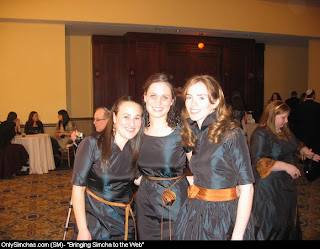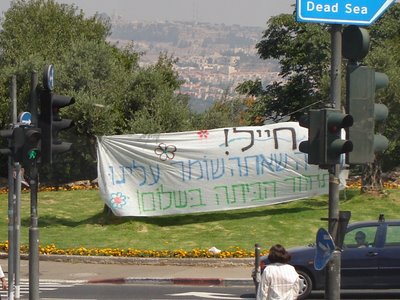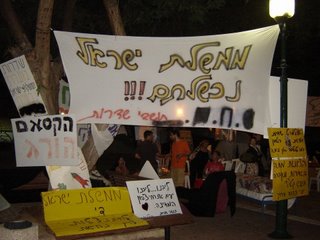

(becky, tal, assaf on top of mt. hermon)

(view of the golan)

(tal, becky, assaf in one piece at the end of the day)

My Adventures, Funny Stories, Current Events, and Random Ruminations


(becky, tal, assaf on top of mt. hermon)

(view of the golan)

(tal, becky, assaf in one piece at the end of the day)

(view from my bedroom window this morning) (pedestrian braving the streets beneath my balcony)
(pedestrian braving the streets beneath my balcony) (around the corner from my apartment, in full snow/slush gear)
(around the corner from my apartment, in full snow/slush gear) ...look around, leaves are brown now, and the sky is a hazy shade of winter...
...look around, leaves are brown now, and the sky is a hazy shade of winter...
 On Tuesday afternoon, as clouds gathered over Jerusalem, I grabbed my camera and headed to the Old City. In anticipation of President Bush's visit to Israel, a group called One Jerusalem organized a rally to oppose Olmert's declaration that Jerusalem should be divided. The rally called upon Israelis to come to Jerusalem and form a human chain around the Old City as an expression of our firm support for a united Jerusalem. It was hoped that this would send a message to President Bush: Jerusalem is the eternal capital of Israel and the Jewish people, and must therefore not be divided.
On Tuesday afternoon, as clouds gathered over Jerusalem, I grabbed my camera and headed to the Old City. In anticipation of President Bush's visit to Israel, a group called One Jerusalem organized a rally to oppose Olmert's declaration that Jerusalem should be divided. The rally called upon Israelis to come to Jerusalem and form a human chain around the Old City as an expression of our firm support for a united Jerusalem. It was hoped that this would send a message to President Bush: Jerusalem is the eternal capital of Israel and the Jewish people, and must therefore not be divided.Perhaps most significantly, Jerusalem is of supreme importance to the Jewish people from a religious and Biblical perpspective. The Bible refers to Jerusalem by name over 700 times. Additionally, Rabbinic literature, the Talmud and Midrash, are brimming with references to Jerusalem. The Midrash tells us that the Beit HaMikdash (the Temple) was built in Jerusalem on the very site where Abraham bound Isaac. Yet another midrash locates the site of the Temple as the place where Hevel (Abel) built his mizbeiach (altar) to G-d. This was the first time a human attempted to connect with G-d following the expulsion from the Garden of Eden. King David declared Jerusalem the capital during his reign as monarch of the Jewish people. King Solomon took the political centralization of Jerusalem one step further by building the Temple and creating the spiritual-religious center for the Jewish people. To this day, wherever in the world a Jew may be, he turns in prayer toward Jerusalem.
The rabbis explain that there is a heavenly Jerusalem (Yerushalaim shel ma'alah) perched over the earthly Jerusalem (Yerushalaim shel matah). This idea is anchored in both Isaiah's, as well as Micha's, prophecy. In masechet Taanit 5a, Rabbi Yochanan is quoted as saying: "The Holy One blessed be He declared, ‘I shall not enter the heavenly Jerusalem until I can enter the earthly Jerusalem.'" The relationship between the 'upper' Jerusalem and the 'lower' Jerusalem is clear. We must constantly strive to make the Jerusalem in which we live, Yerushalaim shel Matah, worthy of G-d's presence in order to merit the union between the two Yerushalaim's, for the two are inextricably connected.
As the skies opened up on Tuesday, these thoughts invaded my mind. I gazed at the human chain hugging the towering Old City walls. I stood near Natan Sharansky as he was interviewed by several different news outlets. To stand next to such a hero, as he exercised his freedom of speech at the entrance to the Old City, was quite inspiring. Sharansky criticized President Bush for failing to implement the ideology he has repeatedly outlined regarding terrorist states, such as Hamas. Similar views were echoed by MK Yisrael Katz, Nir Barkat, opposition leader in the Jerusalem City Council, and Yechiel Leiter (former chief of staff to Netanyahu), who called Olmert to task for forgetting that eight years earlier- to the date- Olmert had pleaded with then President Clinton to keep Jerusalem united.
 (at the rally: a man blows a shofar)
(at the rally: a man blows a shofar) (Natan Sharansky, MK Yisrael Katz, Yechiel Leiter)
(Natan Sharansky, MK Yisrael Katz, Yechiel Leiter)
(top picture: human chain wrapping around the Old City walls)

(Daniel, our "fix-it" guy)


(Becky and Mom eating cotton candy in front of the Cave)

(Jewish star above a home formerly owned by Jews in the Hebron kasbah)

 The Friday morning parade kicked off several days of celebration and festivities. I celebrated Tel Aviv Purim on Saturday night and then Jerusalem Purim on Sunday night and Monday. One of the highlights was celebrating the holiday with my sister. We were both dressed up as characters from the 70's. She, a 70's film producer (with all the attendant attitude) and I, well, I'm not sure what or who I was meant to be. We took Jerusalem by storm, hearing megilla together, dancing at a Chaim Dovid concert, creating a spectacle with our costumes at a friend's party, and celebrating with over 10,000 fellow Jerusalemites in the shuk (open-air market), Mahcane Yehuda from 12-2am!!
The Friday morning parade kicked off several days of celebration and festivities. I celebrated Tel Aviv Purim on Saturday night and then Jerusalem Purim on Sunday night and Monday. One of the highlights was celebrating the holiday with my sister. We were both dressed up as characters from the 70's. She, a 70's film producer (with all the attendant attitude) and I, well, I'm not sure what or who I was meant to be. We took Jerusalem by storm, hearing megilla together, dancing at a Chaim Dovid concert, creating a spectacle with our costumes at a friend's party, and celebrating with over 10,000 fellow Jerusalemites in the shuk (open-air market), Mahcane Yehuda from 12-2am!!
My Mother shared some reflections with me on the megilla and Ester's pivotal role in saving the Jewish people. She noted the importance of strong women who take action to affect change. Throughout Jewish history, the Jewish people have repeatedly found themselves in desperate, threatening situations, similar to that faced by the Jews of Persia during the time of the Megilla. While at first she was reluctant, Ester came into her own and realized her responsibility to the Jewish people when Mordechai reminded her: "Who knows if it was for this sole purpose that you became queen?" Ester was inspired and transformed by Mordechai's words and felt compelled to act, saving the Jewish people. On that inspiring note, my Mother reminded me (and the women who sat at her Purim seuda in Los Angeles) of the role we play and the potential we have as strong women to continue to affect change for the Jewish people today. I can think of no better role model to impart this very lesson than my own Mother, who is a sterling and singular example of a strong woman, dedicated to her convictions, who exudes integrity and grace in all she does.
Although we have barely recuperated from Purim, we are already beginning preparations for Pesach (Passover). We anxiously await our parents' arrival and the celebration of the Jews' redemption from Egypt...
 above: becky and elderly chinese women selling flower wreaths on the bank of the river in yungshuo, china. in the background are limestone green karsts surrouding the region. yungshuo is known as the "backpacker's paradise." it truly is a slice of paradise- a charming village tucked away in the mountains and limestone karsts of southern china, surrounded by rivers, populated by welcoming and kind natives.
above: becky and elderly chinese women selling flower wreaths on the bank of the river in yungshuo, china. in the background are limestone green karsts surrouding the region. yungshuo is known as the "backpacker's paradise." it truly is a slice of paradise- a charming village tucked away in the mountains and limestone karsts of southern china, surrounded by rivers, populated by welcoming and kind natives. above: yael and becky with fenguangjien, fengenjie, and mochaoyan, our incredible friends from nanning. this picture was taken on the main bridge in yungshuo after fengenjie, 11, set off a gigantic case of fireworks in front of us! apparently, it's a chinese custom for children of all ages to set off fireworks during the week of the chinese new year! this warm and quirky family took us under their care, hiking with us, arranging rides for us, making phone calls to get us tickets to a sold-out chinese conert which was attended by 10,000 people, treating us to beer and tea, and translating for us with the minimal english they knew. we are forever grateful!
above: yael and becky with fenguangjien, fengenjie, and mochaoyan, our incredible friends from nanning. this picture was taken on the main bridge in yungshuo after fengenjie, 11, set off a gigantic case of fireworks in front of us! apparently, it's a chinese custom for children of all ages to set off fireworks during the week of the chinese new year! this warm and quirky family took us under their care, hiking with us, arranging rides for us, making phone calls to get us tickets to a sold-out chinese conert which was attended by 10,000 people, treating us to beer and tea, and translating for us with the minimal english they knew. we are forever grateful!


above: famous artist and becky in his shop in xingping. thanks to our chinese friends we discovered that this artist is one of the most well-known artists in the guanxi province (a region in southern china). i bought the painting i'm holding from him for $2.00!
 above: becky on the great wall in mutianyu, china. this was a real highlight of the trip. we arrived at the great wall before 8am. there was not a person in sight for miles in either direction. perhaps i had had low expectations, but i was overwhelmed by the experience. the wall and its surrounding panaroma were awe-inspiring. the stunning mountains rolled on for as far as the eye can see in every direction. the air was crisp and fresh. and it was silent. perfect serenity.
above: becky on the great wall in mutianyu, china. this was a real highlight of the trip. we arrived at the great wall before 8am. there was not a person in sight for miles in either direction. perhaps i had had low expectations, but i was overwhelmed by the experience. the wall and its surrounding panaroma were awe-inspiring. the stunning mountains rolled on for as far as the eye can see in every direction. the air was crisp and fresh. and it was silent. perfect serenity.

above: a snippet from the forbidden city in beijing, china. the forbidden city, like beijing is incredibly vast. instead of trying to capture the vastness, i chose to focus on the exquisite colors and unique chinese architecture which are emblematic of the forbidden city. the forbidden city housed the qing and ming emperors and stretches over one million square meters-- in the middle of the city of beijing! it is truly a sight to behold. beijing itself can only be described as vast. one block on a map can stretch on for close to a mile and the streets are comprised of between 10 and 12 lanes!
these pictures only begin to scratch the surface of the incredible sights and experiences we enjoyed during our two weeks in asia. there is much too much to write here about the culture we saw, the experience of being in a communist country, the impressions of the people about their own country and ours, the diversity of such a large country, the land itself, and onward. overall, i had an extremely positive impression of the country and its people. i look forward to returning one day.



 (these pictures are from this summer, during the month-long cherry season in israel)
(these pictures are from this summer, during the month-long cherry season in israel)
 Signs like this appear all over Jerusalem. This particular sign appears on the road exiting Jerusalem. The homemade sign reads: "Soldier, Thank you for watching over us. Come home in peace!"
Signs like this appear all over Jerusalem. This particular sign appears on the road exiting Jerusalem. The homemade sign reads: "Soldier, Thank you for watching over us. Come home in peace!" before we arrived at the bus, we stopped by the protest tent next to the municipality. the protest tent was erected several months ago by residents of sderot wishing to send a message to the government: put an end to kassams falling on sderot. i had assumed that the protest tent would be empty following the idf's incursion into gaza. however, we discovered about 10 people, secular sderot citizens, sitting in the tent.
before we arrived at the bus, we stopped by the protest tent next to the municipality. the protest tent was erected several months ago by residents of sderot wishing to send a message to the government: put an end to kassams falling on sderot. i had assumed that the protest tent would be empty following the idf's incursion into gaza. however, we discovered about 10 people, secular sderot citizens, sitting in the tent.